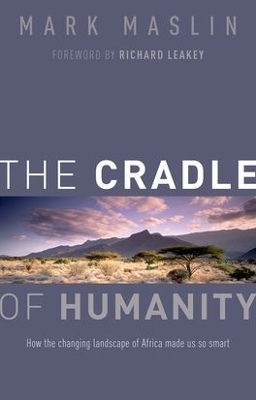
The Cradle of Humanity
Oxford University Press (Verlag)
978-0-19-870452-2 (ISBN)
Humans are rather weak when compared with many other animals. We are not particular fast and have no natural weapons. Yet Homo sapiens currently number nearly 7.5 billion and are set to rise to nearly 10 billion by the middle of this century. We have influenced almost every part of the Earth system and as a consequence are changing the global environmental and evolutionary trajectory of the Earth. So how did we become the worlds apex predator and take over the planet?
Fundamental to our success is our intelligence, not only individually but more importantly collectively. But why did evolution favour the brainy ape? Given the calorific cost of running our large brains, not to mention the difficulties posed for childbirth, this bizarre adaptation must have given our ancestors a considerable advantage. In this book Mark Maslin brings together the latest insights from hominin fossils and combines them with evidence of the changing landscape of the East African Rift Valley to show how all these factors led to selection pressures that favoured our ultrasocial brains. Astronomy, geology, climate, and landscape all had a part to play in making East Africa the cradle of humanity and allowing us to dominate the planet.
Mark Maslin (FRGS, FRSA) is a Professor of Climatology and Environmental Sciences at University College London, and is currently a Royal Society Industrial Fellow. He was the former Director of the UCL Environment Institute and Head of the Department of Geography, and in recent years has presented over 45 public talks, at the UK Space conference, Oxford, Cambridge, Tate Modern, Royal Society of Medicine, British Museum, Natural History Museum, Freshfields, Goldman Sachs and both the Norwegian and UK Government. He has been published in multiple journals, and is the author of Climate: A Very Short Introduction (OUP, 2013), and Climate Change: A Very Short Introduction (OUP, 2014), now in its third editon.
1: In the Beginning
2: Early Human Evolution
3: Tectonic and Climate
4: Cradle of Humanity
5: Global Climate Change
6: Celestial Mechanics
7: African Climate Pulses
8: The Social Brain
9: Future of Humanity
10: The story so far
Further Reading
| Erscheinungsdatum | 29.12.2016 |
|---|---|
| Zusatzinfo | Approximately 20 black and white figures |
| Verlagsort | Oxford |
| Sprache | englisch |
| Maße | 145 x 222 mm |
| Gewicht | 388 g |
| Themenwelt | Sachbuch/Ratgeber ► Natur / Technik |
| Naturwissenschaften ► Biologie ► Evolution | |
| Naturwissenschaften ► Biologie ► Humanbiologie | |
| ISBN-10 | 0-19-870452-6 / 0198704526 |
| ISBN-13 | 978-0-19-870452-2 / 9780198704522 |
| Zustand | Neuware |
| Haben Sie eine Frage zum Produkt? |
aus dem Bereich


